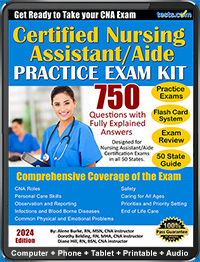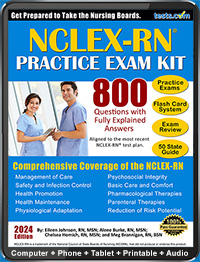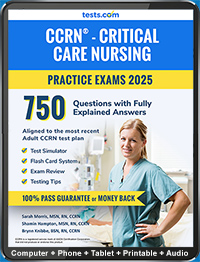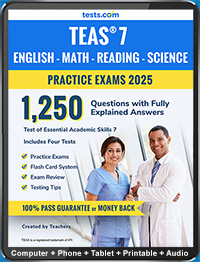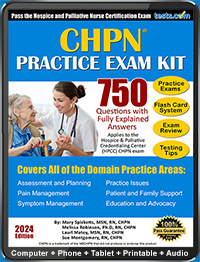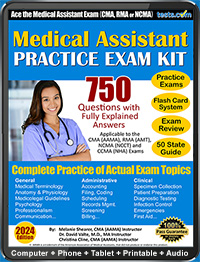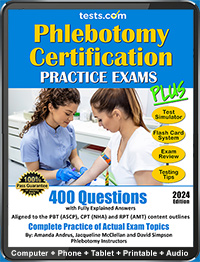By Andrea Cohen, Tests.com Contributing Writer
There are a number of exams required for nursing licensing and certification, depending on the type of nursing profession desired and the specialty a nurse wishes to pursue.
The NCLEX exams are nursing licensing exams administered by the National Council of State Boards of Nursing (NCSBN) that test the knowledge, abilities and skills required in order to safely and effectively practice nursing as a registered nurse or practical nurse. There are two different exams – the NCLEX-RN for licensing registered nurses and the NCLEX-PN for licensing practical nurses.
For those wishing to become certified nursing assistants, CNA exams are offered following nursing assistant educational courses.
Finally, there are a myriad of nursing specialty exams that can be taken for various reasons. In some cases, specialty exams are taken during educational courses to test specific knowledge about a nursing specialty. In other cases, nurses that wish to become credentialed in certain specialties can take specialty exams offered by various organizations. The most prestigious credentialing agency for nursing specialties is the American Nurses Credentialing Center (ANCC), which is affiliated with the American Nursing Association (ANA), but there are numerous other organizations that also offer specialty exams for different clinical nursing areas.
NCLEX Exam
NCLEX exams are required by each individual state board of nursing prior to becoming licensed as a registered nurse or practical nurse in any state. The NCLEX-RN exam is for licensing registered nurses and the NCLEX-PN is for licensing practical nurses.
Nursing candidates must first submit an application for licensure to the board of nursing in the state they wish to be licensed. Candidates must also register for the NCLEX exam directly through Pearson VUE, an independent third party testing center, which can be done online, by mail or by phone, and must pay the $200 exam fee at that time. If a candidate meets all of the eligibility requirements determined by the nursing board, they will receive an Authorization to Test (ATT) notice from Pearson VUE. There is a 365 day time period during which eligibility remains valid to test from the time registration is submitted. Test appointments cannot be scheduled until candidates have the ATT in hand.
All NCLEX exams are offered in a computerized, adaptive testing format. The exams are broken into separate categories, including safe and effective care, health promotion and maintenance, psychosocial integrity and physiological integrity.
Computerized adaptive tests means that number of questions asked can change depending on the candidate taking the test. The NCLEX-RN exam is between 75 and 265 questions, with 15 of the questions not scored. The NCLEX-PN exam is between 85 to 205 questions with 25 questions that are not scored. The NCLEX-RN has a six hour time limit, while the NCLEX-PN exam has a five hour time limit.
Every question must be answered on the exam in order to move onto the next question on the computer. There are a variety of types of questions asked, including multiple choice, exhibit items, fill in the blanks, drag and drop items and hot spot items where the candidate has to locate a specific area on the computer to answer the question.
NCLEX exam scoring takes into account the difficulty of the questions that are being asked and once a candidate’s ability is determined with complete certainty to be above or below the passing score of 95%, the exam is over, regardless of the number of questions that have already been answered. The length of the exam does not determine whether it has been passed or failed. The only way that NCLEX exam results are given to candidates is through the state boards of nursing, and they usually take about a month to receive.
CNA Exams
CNA exams are exams that certify nursing assistants. Following a nursing assistant course, students can choose whether or not they want to take a CNA exam so they can become certified. Becoming certified usually leads to better job opportunities and higher compensation. CNA exams may differ slightly by state.
There are two parts of a CNA exam. There is a written portion of the test which tests general knowledge learned during CNA classes, including basic care and medical concepts. There is also a clinical portion of the exam, where students have to demonstrate certain nursing assistant skills, such as grooming a patient, repositioning a patient in bed, providing a bedpan, taking a temperature, hand washing or other similar skills. Candidates may be asked to bring someone to act as the patient during the exam. Usually candidates are asked to perform three to five skills while being observed by an approved medical examiner. Candidates are usually told right after the test whether or not they passed, and if a test is failed, it can be retaken. Time limits and fees may vary among CNA exams.
Nursing Specialty Exams
Registered nurses can take specialty exams so that they can be eligible for employment opportunities in specialized nursing areas. Sometimes these exams are administered during a nursing curriculum. Some specialty exams are offered by specific organizations and when passed a nurse becomes certified in that specialty. Other times, the specialty exam is offered by the state or by an educational facility. Below are just some of the many nursing specialty area exams that are available on a general level and are not specifically affiliated with any one organization or credentialing agency.
For RNs:
- Cardiac Care
- Community Health
- Critical Care
- Fundamentals of Nursing
- Gerontology
- Health Assessment
- Management
- Management/Community Health
- Maternity Nursing
- Maternity/Pediatric Nursing
- Medical/Surgical Nursing
- Nutrition
- Orthopedics
- Pathophysiology
- Pediatric Nursing
- Pharmacology
- Psychiatric/Mental Health Nursing
- Research
- LPN/LVN-to-AND
- BSN-to-RN
For LPNs:
- Fundamentals of Nursing
- Maternity Nursing
- Maternity/Pediatric Nursing
- Medical/Surgical Nursing
- Pediatric Nursing
- Pharmacology
- Psychiatric Nursing
The American Nurses Credentialing Center (ANCC) is one of the most prestigious organizations that tests and certifies nurses in many specialty areas. The organization is a subsidiary of the American Nursing Association (ANA). Becoming certified by ANCC in any specialty offers nurses the opportunity to excel in their profession, command better jobs and compensation, and advance their knowledge and careers.
Specialty exams are offered for:
- Ambulatory Care Nursing
- Cardiac Rehabilitation Nurse
- Cardiac Vascular Nurse
- Case Management Nurse
- College Health Nurse
- Community Health Nurse
- Gerontological Nurse
- High-Risk Perinatal Nurse
- Home Health Nurse
- Informatics Nurse
- Maternal-Child Nurse
- Medical-Surgical Nurse
- Nurse Executive
- Nursing Professional Development
- Pain Management
- Pediatric Nurse
- Perinatal Nurse
- Psychiatric & Mental Health Nurse
- School Nurse
Nurse Practitioners
- Acute Care NP
- Adult NP
- Adult Psychiatric & Mental Health NP
- Diabetes Management - Advanced
- Family NP
- Family Psych & Mental Health NP
- Gerontological NP
- Pediatric NP
- School NP
Clinical Nurse Specialists
- Adult Health CNS
- Adult Psychiatric & Mental Health CNS
- Child\Adolescent Psych & Mental Health CNS
- CNS Core Exam
- Diabetes Management - Advanced
- Gerontological CNS
- Home Health CNS
- Pediatric CNS
- Public/Community Health CNS
Other Advanced-Level
- Diabetes Management - Advanced
- Nurse Executive - Advanced
- Public Health Nursing - Advanced
ANCC is not the only agency that credentials nursing specialties, although it is the most prestigious. Nurses can be credentialed in more than one specialty by pursuing education or training in multiple specialties and passing exams for each. Fees, formats, and lengths of tests may vary by specialty and by organization offering the exams.
Interested in becoming a Nurse or Nursing Assistant? Check out our Nursing Test Directory for more.

